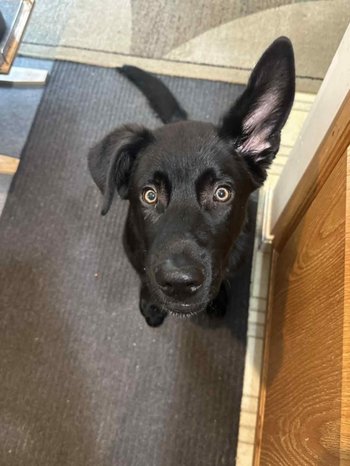Kyro's first solo flight
By Jennifer Stoeckl, MAT - Dire Wolf Project CEO, April 18, 2025
In the still hush of dawn, a young black wolf-gray male stirred for one last day at Dire Wolf Project headquarters.
His name is Kyro.
And he is bold, observant, and gentle-hearted.
He stands tall even for a pup, with fur the color of midnight and eyes like twin moons.
He didn’t know it yet, but Kyro was about to leave the only home he’d ever known.
There wouldn’t be a grand howling farewell, or a chorus from his littermates.
Just a quiet bath, a soft towel, and the gentle hands of his human alpha as she whispered to him, brushing water from his ears and telling him what a good boy he was.
He was clean, calm, and ready—but not ready in the way one is prepared for adventure.
Ready, in the way a pup must be when the pack chooses a new path for him.
With his travel crate cleaned and packed, papers in hand, and nerves bubbling beneath the surface, Kyro and I made the long trek to town.
Kyro, nestled in a wire crate so he wouldn’t soil his hard-sided airline crate, rode quietly in the back.
He was quiet, watchful.
Every so often, he’d glance at me, those golden eyes asking, “Why are we going alone today?”
I reassured him with my voice that everything was going to be okay.
We arrived early—four hours early, to be precise.
Being that early isn’t just for sport.
I’ve learned that flying a pup like Kyro isn’t always simple.
Once, a cargo handler took one look at one of our American Dirus pups and called her a wolf.
It took DNA papers and a lot of fast talking to convince them otherwise.
So I’ve learned—it pays to be early.
Sometimes, it means the difference between a pup flying or staying grounded.
Being that early is also a good excuse to walk and potty to help puppies be sufficiently tired so that they sleep through the flight.
Kyro and I walked a quiet dirt road near the airport, away from the echo of jet engines and the buzz of city noise.
He sniffed the gravel, left his mark in the weeds, and stuck close to my side.
That’s the kind of boy he is—pack-focused and tender-hearted.
He knows exactly how to win over a human, too.
When he wants affection, he sits politely in front of me and tilts his face upward, golden eyes shining like the last light of sunset.
It’s impossible not to kneel down and wrap him in love.
But eventually, the time came.
I drove him back to the cargo facility and began the check in process.
After weighing in, the attendants zip-tied his crate closed—standard regulation.
Once sealed, no one, not even me, can open it.
For the next 15 hours, Kyro would be alone.
He’d hear the rumble of engines, the chatter of strangers, the sharp bark of unfamiliar dogs in crates beside him, maybe even the shifting of heavy bags or other cargo nearby.
In that crate, in the belly of the plane, he’d ride beside all sorts of strange companions—luggage, fish, boxes, even the occasional human remains.
That’s the world of air cargo: impersonal, noisy, and full of mystery.
He whimpered a little as he sat on the scale and he could no longer see me.
I moved back to his crate and put my fingers through the slats.
He nosed them gently, then settled… for a while.
But as is the way with our sensitive, emotionally intuitive American Dirus pups, the worry crept back in.
Again and again, I comforted him until he rested his head on his front paws and it was time to say goodbye.
Then, I watched him disappear behind a metal door.
And that was it.
No warm lap.
No lullaby.
Just cold concrete and cargo handlers with gloves.
Kyro flew on the red-eye, which, thankfully, syncs with his natural rhythms.
Nighttime means sleep.
And thanks to a tight connection in Seattle, he wouldn’t have to wait long in a kennel run by strangers.
He was transferred quickly and quietly, from one flight to the next.
And just like that—he was across the country.
To his new family in Pennsylvania, Kyro’s journey likely felt like magic.
One day he was a picture in an email… the next, a real live pup blinking up at them with those haunting yellow eyes.
But the journey?
The journey is real.
The crate cost $100.
The absorbent pad, $11.
The flight itself? $520.
In the end, that’s barely cheaper than our hand-delivery option with personal guidance and post-arrival training support.
But more importantly, the true cost isn’t measured in dollars.
It’s in the toll taken on the heart of a pup who leaves behind his pack and braves the unknown alone.
Kyro is now safe.
He is loved.
And his story—like so many others—is one of bravery.
So the next time someone asks, “Why not just fly your pup home?”—tell them Kyro’s story.
Because to the world, he might just be another dog on a flight.
But to us? He’s a once-in-a-lifetime pup finding his way across the skies.
How will YOU bring your puppy home?
Here’s the link to read the options:
https://direwolfproject.com/direwolf-dogs/direwolf-express/how-will-my-puppy-get-home/
Jennifer Stoeckl is the co-founder of the Dire Wolf Project, founder of the DireWolf Guardians American Dirus Dog Training Program, and owner/operator of DireWolf Dogs of Vallecito. She lives in the beautiful inland northwest among the Ponderosa pine forests with her pack of American Dirus dogs.